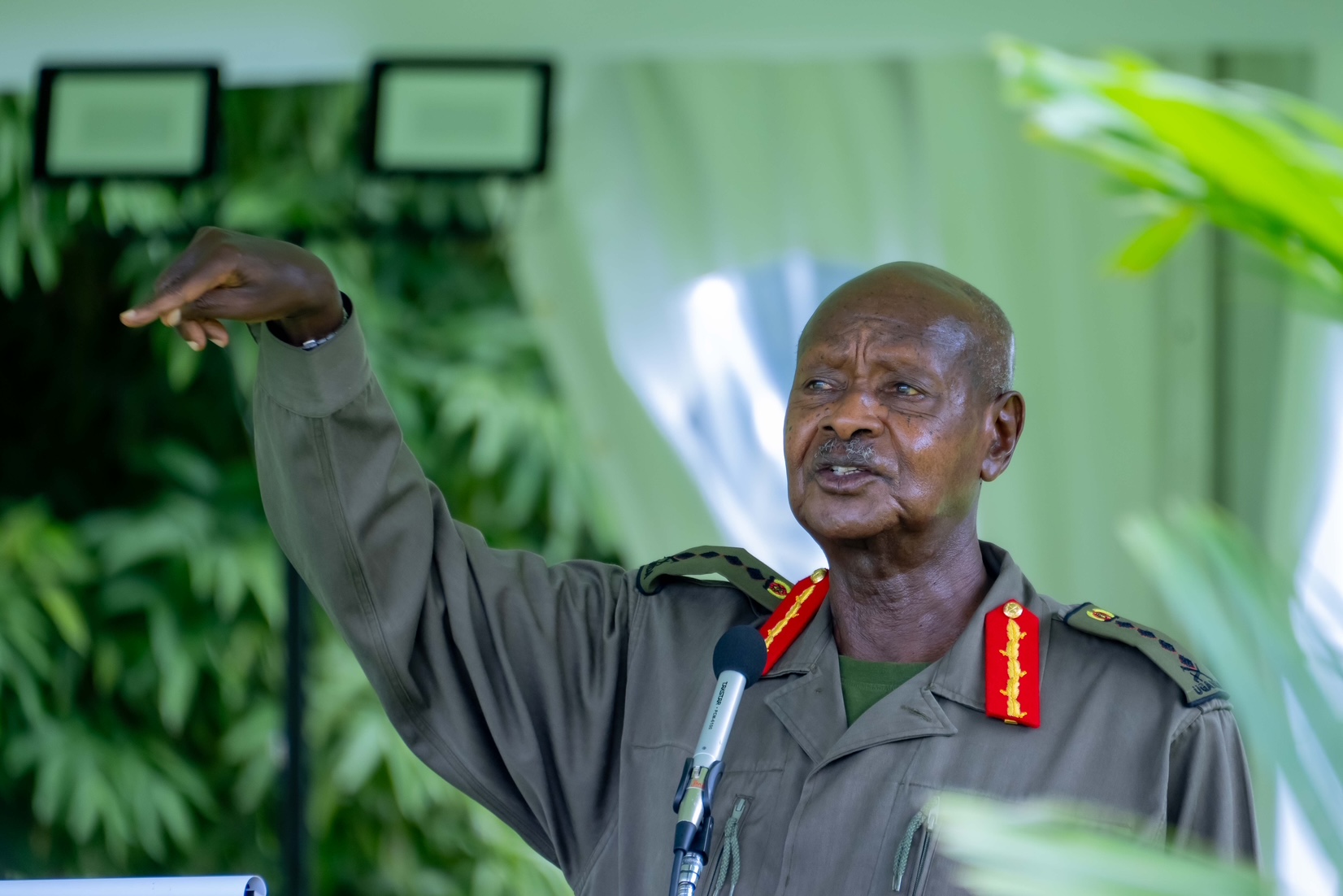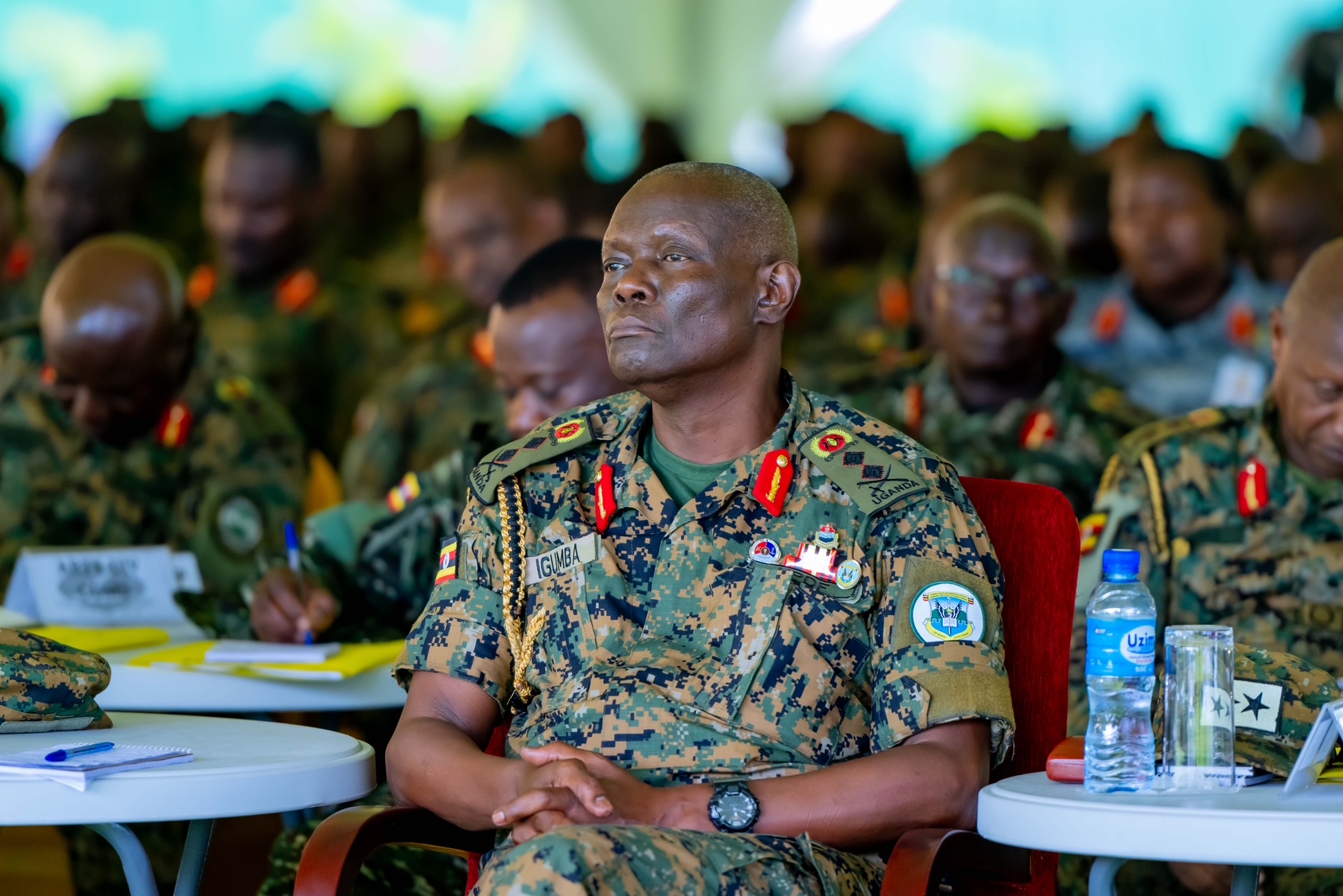Museveni condemns political hooliganism at Defence Council meeting
During the meeting he hosted at State House, Entebbe, the President criticised certain politicians for engaging in practices that intimidate citizens, calling an end to such behaviour.
President Museveni emphasised the importance of patriotism and Pan-Africanism in economic development. (Credit: PPU)

Admin .
@New Vision
KAMPALA - President Yoweri Kaguta Museveni, the Commander-in-Chief of the Uganda People's Defence Forces (UPDF), has emphasised the need for disciplined democracy in Uganda.
“On the issues of democracy, which is one of the four principles of the NRM, we want disciplined democracy not hooliganism, not bad language because we want Ugandans to decide what they want without intimidation,” President Museveni stated on Thursday May 8th while chairing a meeting of the Defence Forces Council, the supreme decision-making body of the UPDF.
During the meeting he hosted at State House, Entebbe, the President criticised certain politicians for engaging in practices that intimidate citizens, calling an end to such behaviour.
“This must stop; this is not the African way. That is going to stop. The security agencies have discussed it, and it's going to stop. You must speak very well in public, don't try to speak badly,” he stated. 
President Museveni, while addressing the Defence Forces Council, highlighted cultural expectations regarding respectful discourse. (Credit: PPU)
The Defence Forces Council meeting followed a High Command meeting chaired by the President on Wednesday, May 7, 2025, at State House Entebbe.
President Museveni, while addressing the Defence Forces Council, highlighted cultural expectations regarding respectful discourse.
“With the Banyankole, if you talk badly, they will ask you whether you are feeding them,” he noted, according to the Presidential Press Unit.
President Museveni further addressed issues of corruption, recalling the early days when soldiers received very small salaries. He emphasised initiatives undertaken to improve their welfare.
“When we started, soldiers had very small salaries, but we built army schools so that children of the soldiers, study freely. We constructed barracks so that soldiers don't have to hire houses. Then we started SACCOs so that the soldiers, even with small salaries, could solve their problems,” he explained.
He tasked the army leadership to continue working on these initiatives to enhance the welfare of soldiers.

Improving Household incomes:
On wealth creation, President Museveni advocated for intensive and extensive agriculture, especially for families of the soldiers with small land holdings.
“If you have a small piece of land, like in the Lugbara area, where a family has about two acres, and you put that land in tobacco or cotton, it's little money per acre per annum. You must produce a good or service for sale, but you must do it with 'ekibalo' (calculation),” he advised.
He also elaborated on the Four-Acre Model introduced in the 1996 NRM manifesto.
“We said if you have four acres, you can do seven activities: one acre for coffee, which can get you maybe Shs15 million per acre per annum; the second acre for fruits; the third acre for pasture for zero-grazing cows. You can support eight friesian cows on one acre; the fourth acre for food crops for the family.
In the backyard, you can do poultry for eggs, piggery if you're not a Muslim, and if you're near swamps, you can do fish farming. Fish farming brings a lot of money; in one acre, you can put four fishponds and get as much as Shs 80 million,” he lectured.

He also mentioned the potential of other high-value crops, listing oil palm, cocoa, and avocado.
President Museveni emphasised the importance of patriotism and Pan-Africanism in economic development.
“If you go to Acholi, you'll find all the people there producing sim sim; they don't buy from one another because they are producing similar products. You go to Banyankole, they produce milk, beef, bananas, and so on. So, who will buy? That's why we said the first principle of the NRM is patriotism; love Uganda because we need Ugandans for prosperity,” he noted.
Regional integration and markets:
“We have many products in surplus, for example, sugar, 700,000 tonnes, and we are only consuming 300,000, leaving a surplus of 400,000. We also have a surplus of milk and maize. If you take the line of sectarianism, aren't you endangering your own people? That's why we said we need Pan-Africanism; love Africa because you need it,” he noted.
On the other hand, President Museveni discussed the necessity of socio-economic transformation.
“All things in nature must transform. You can't have a sustainable pregnancy in year one, year two. Pregnancy stays small in the womb, but the woman grows quantitatively and qualitatively, and at the end of nine months, there must be transformation; the fetus must become a baby. That's how nature is; you grow quantitatively and also qualitatively.”
“African societies in the past had normalised generational poverty, you can't be a peasant from generation to generation; that's terrible.”

Addressing the issue of security, President Museveni expressed concerns about global advancements.
“Some actors in the world have been talking for some years about four-dimensional superiority, superior on land, at sea, in the air, and in space. The Americans are there, Russians, Chinese and Indians. For us, we are still here on earth. Even if Uganda became a first-class country, it would still lack the size needed to compete globally. Integration gives us the size and strength to achieve strategic goals,” he remarked.
“That's why we said that mission number two is security. That's why we, the freedom fighters, emphasise it.” He also urged the youth to uphold the values of the NRM.
In his remarks, the Chief of Defence Forces (CDF), Gen. Muhoozi Kainerugaba, reaffirmed UPDF’s commitment to securing Uganda and its neighbours, warning both internal and external enemies that the force is ready for any mission or hardship to ensure the safety and prosperity of Ugandans.
Describing the gathering as timely and critical, citing pressing security issues within and beyond Uganda’s borders, Gen. Muhoozi said that the two-day engagements gave the senior commanders" opportunity to share and pad critical information down to our commanding officers and directors".
In his account, Gen. Kainetugaba said that the UPDF "continues to do a lot of work, including Operation Shujaa, which was initially concentrated on neutralising threats within the DRC.”
Back home, Gen. Muhoozi described the security situation in Uganda as relatively calm, with notable gains in Karamoja.

“The cattle rustlers in Karamoja have calmed down. We shall consolidate these gains and ensure that the Karachunas do not rearm,” he reported.
Turning to urban security, the CDF raised concerns about criminal elements in the Kampala Metropolitan Area and warned of armed political actors sowing instability.
“We are dealing firmly with urban criminality. No one will be allowed to disrupt the peace of Ugandans. We are closely monitoring those who want to cause trouble without fear or favour and in conformity with the law,” Gen. Muhoozi emphasised.
Fortunately, this reactionary movement is not observed across the country. It is mainly concentrated in Kampala, but let it be clear, Kampala is the capital city of Uganda, and all Ugandans must feel safe and secure in their city,” he noted.
Gen. Kainerugaba said that UPDF intelligence and security forces remain on high alert to prevent any surprise attacks, especially during the forthcoming general elections.

The CDF highlighted ongoing enhancements in soldiers’ welfare, emphasising improvements in housing, clothing, feeding, healthcare, transport, and logistics, among others.
Gen. Muhoozi also thanked President Museveni for his leadership and continued support to the army.
“Thanking the Commander in Chief for the support and leadership, he stated, "your Excellency, we thank you for your guidance and for taking time to meet and advise us. Let’s continue to strengthen our ties with our African brothers and sisters,” he said.
“Under your guidance, the UPDF is ready for any mission. We are committed to the security of our people, the stability of our neighbours and the sustainable prosperity of our nation.”
Apart from the UPDF top leadership, dignitaries at the meeting included: the Minister of Defence and Veteran Affairs, Jacob Oboth Oboth, and several officials from the Ministry.
Comments
No Comment